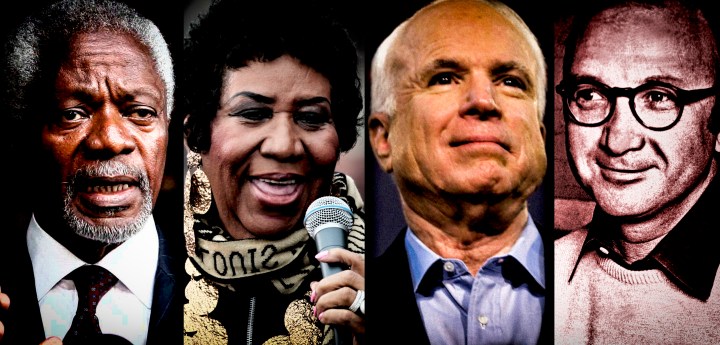RIP, VIPS
The Passing of the Great Ones

All at once it seems, the world has lost some of the greats – Kofi Annan, Aretha Franklin, John McCain and Neil Simon. It does not seem quite fair. But it’s what must happen.
Within the past two weeks, some of the great ones have left us. Former UN Secretary General Kofi Annan, soul and gospel singer Aretha Franklin, playwright Neil Simon, and now, American senator John McCain have all passed away amid great public sadness. But in the midst of all of these major figures with their global reputations, our own family has been captured by another “smaller” death. How such passings affect one speaks to how we treat public celebrity as well as private sadness.
In this same period, as these large publicly remarked upon and mourned deaths, my wife’s older brother also passed away from a short but fatal illness. Now, truth be told, her brother was not a world-straddling figure. It is very unlikely that any statues will ever be erected in his honour and almost no chance that any bridges or buildings will memorialise his memory. He did not negotiate global treaties and he never led a massive international organisation.
He had not fought in a vicious war, survived over half a decade as a PoW in extraordinarily harsh conditions and then become a politician who became a synonym for straight-talking honesty and adherence to principle. Nor had he written dozens of immensely popular plays and movies that entertained generations of people around the world. And he had not sung (and recorded) a vast repertoire of deeply loved music that included among them totemic tunes that became the soundtrack for two civil rights struggles.
Instead, he had led a quiet life, but one in which he was always ready to lend a hand to others, regardless of whether or not they were family members, friends or just members of his community. After years of working in a lifetime of routine jobs, in his retirement, he served quietly as a largely unheralded backstop for community organisations such as those devoted to the care of the disabled or with a centre for early childhood education for children who came from some of the most dire economic circumstances. On a more personal level, he had stepped up to become the surrogate father to his young granddaughter, after the child’s father – his son – had died suddenly in a motor vehicle accident. And he loved to cook and to fix cars. But even in this seeming near-anonymity, his passing has now left family members, friends, and even casual acquaintances, shaken by the suddenness of his passing, and the realisation his chapter has now been concluded.
But understanding the impact of a more personal family loss such as this one also helps us attempt to accept what much more public losses may mean for millions around the world when their passing leaves one with a great gap.
In the case of Kofi Annan, his ascension to the world’s most important global civil servant’s position had become a source of enormous pride for millions of Africans, and his commitment to broadening out the mission, reach and impact of the world body he had led had reverberated with many millions more around the world. That he had made mistakes in dealing with the horrific killings in Rwanda and Bosnia had clearly troubled him immensely, and his opposition to the US-led invasion of Iraq in 2003 justified by demonstrably false pretences stood him in much better stead, even though, in the end, he had been powerless to prevent its occurrence.
But then, just a few days later, the soul and gospel singer, Aretha Franklin, passed away as well. Anyone who listened to popular music in the 1960s, the ‘70s, the ‘80s, the ‘90s, and then on into the 2000s, had had their inner core touched by her unique delivery, range, emotional quality, musicality, and just sheer “regal-ness” as a performer. Her most iconic songs, instantly recognisable material like R-E-S-P-E-C-T and Natural Woman, ultimately belonged to her alone, regardless of who else might have recorded them. The former became the joyful anthem of both the American civil rights movement and modern feminism alike, while the latter spoke to the ambitions of women who wanted to live and love on their own terms. And, of course, the moment she sang R-E-S-P-E-C-T became one of the greatest cameo appearances in modern film history when Franklin transformed from waitress to outright diva in The Blues Brothers.
Over her life, Franklin had risen well beyond a childhood in which she was a kind of young prodigy of a church gospel singer and in which she had become a mother, twice, before she had lived even a decade and a half. She sometimes made less than perfect choices with her advisers and managers, but she came to be in absolute command of her musical and artistic choices. Late in life, she demonstrated a total ability to own the moment when she sang at the historic inauguration of Barack Obama in 2009. No dry eyes there, including the new president’s.
And then there was the concert where she stepped into Luciano Pavarotti’s big shoes, virtually at the last minute, when the famed tenor had become indisposed, in order to sing Puccini’s famous Nessun Dorma – an aria that had been a signature musical moment for Pavarotti for decades. Regardless, she delivered it with Franklin’s own unique, soulful flourishes. Oh, and just by the way, since she didn’t read sheet music fluently, she had had to learn that classic material, by ear, the night before she had to sing it.
And then there has been the passing of Neil Simon. Here was an author/playwright who ceaselessly turned out plays and film scripts, year after year, seemingly (but not, in truth) without effort. His works garnered the love and loyalty of audiences from their live stage first runs and constant revivals, from television shows derived from his dramas, and from films as well. But precisely because of his literary fecundity, he sometimes gained a disapproving pursing of the lips from critics who thought it had all been just too easy for Simon. Too effortless. Not fair.
In fact, Simon had overcome a dysfunctional early family life, with an often-absent father and an overwrought mother, as he moved into his initial labours as an increasingly prized writer for the kinds of early television comedy shows that were broadcast live, every week, presided over by the great comics of the period. It was great training in the relentless shaping of a perfect laugh line every time; but Simon worried he would be trapped in such an existence forever, unless he could escape from this endless treadmill and strike out on his own for theatrical and cinematic success.
Works like Come Blow Your Horn, The Odd Couple (in stage and film), Barefoot in the Park, Plaza Suite, Lost in Yonkers, Biloxi Blues, and The Goodbye Girl, among so many others, rolled out from his typewriter. And he even had an uncredited role in reshaping the dialogue for the mega-hit A Chorus Line. Amazingly, in 1966, Simon had four shows running on Broadway simultaneously: Sweet Charity, The Star-Spangled Girl, The Odd Couple, and Barefoot in the Park, a feat last accomplished in the 1920s.
Speaking about his work habits and energies, Simon had said:
“Did I relax and watch my boyhood ambitions being fulfilled before my eyes? Not if you were born in the Bronx, in the Depression and Jewish, you don’t.”
And so he worked tirelessly and the plays and movies just kept coming. And coming, and coming.
Over the years, his dramas could be criticised as simply too funny, with too many clever retorts and snappy comebacks. But it was equally true his audiences loved them, perhaps in part because the plays told home truths about the audiences’ own lives and relationships, except that in Simon’s hands, they had better jokes. Or, as he had explained it:
“My view is, ‘how sad and funny life is.’ I can’t think of a humorous situation that does not involve some pain. I used to ask, ‘What is a funny situation?’ Now I ask, ‘What is a sad situation and how can I tell it humorously?’ ”
And then there has been the passing of American Senator John McCain. Over the years, he was, first, a naval aviator from a family with generations of military service. Then he was a prisoner of war in Vietnam for over five years, after his plane had been shot down by a missile over Hanoi, following a bombing run. Then it was a move to Arizona to run for Congress and election to six terms in the Senate, after a tour of duty as naval liaison on Capitol Hill.
Along the way, as he grew in stature as a statesman, as his behaviour became one where his core principles and a brightly displayed sense of right and wrong became the keys to his life, rather than some simple-minded version of absolute party loyalty. That earned him the moniker of being a “maverick”. (We certainly appreciate that.)
His navy friends have said that his agonies as a PoW, including two years in solitary confinement, six months in a full body cast and injuries that included two broken arms and a broken leg, had been key elements in the making of him as a leader. He had famously declined early release on the grounds he did not want to be seen taking advantage of a Vietnamese interest in gaining an edge in future negotiations by their giving the son (him) of the commanding American admiral in the Pacific Ocean an early out from his PoW status ahead of others.
By the time McCain was finally released, his weight had fallen to less than 48 kgs, and he was unable to move his arms above the line of his shoulders. Astonishingly, following his death, Vietnamese people have been leaving flowers and other mementoes in front of a monument marking the spot where his incarceration had taken place. Earlier, McCain had helped push for the establishment of diplomatic relations between Vietnam and the US – and he had visited the country over 20 times to encourage closer ties.
Over the course of his remarkable public career, did McCain make mistakes? An honest evaluation of his life leads one to say, “Yes, of course”. When he was first in the navy, he had earned the reputation as the man you wanted in a punch-up, just as long as he was on your side, and his academic ranking in his Naval Academy graduating class when he had been commissioned was just ahead of last place. (Of course, a number of other rather successful military heroes, such as Ulysses S Grant, also had had undistinguished records; so perhaps class grades aren’t quite the only thing that matters. Maybe character, vision, and insight are worth still more.)
Early on, as a politician, his congressional career had nearly been derailed when he just barely dodged being disgraced in an influence peddling scandal revolving around some very dicey savings and loan institutions. Then, too, there was his vigorous support for the 2003 invasion of Iraq, despite the unproven nature of those chimerical weapons of mass destruction. He later came to regret that vote very deeply – and said so publicly.
Moreover, when he became the Republican nominee for the presidency in 2008, he had picked the thoroughly unproven, clearly unqualified Sarah Palin, the governor of Alaska, as his running mate, thinking her presence on the ticket might help cement a less than firm relationship for him with the increasingly angry populist wing of his party. Here, too, he came to regret that hasty choice, acknowledging later that her selection had helped give voice to the anger and votes of, first, Tea Party Republicans, and then Donald Trump, along with all the other unsavoury populists and know-nothings McCain’s party is now increasingly in thrall to in the polls and elections.
But along the way, too, as he was routinely re-elected to the Senate, McCain came to embody a vigorous support for an active internationalism (along with a concomitant support for military budgets) that the Republican Party and its elected leaders have increasingly fled from embracing in this, the Trump era. And there was also his ability and effort to seek out bipartisanship and friendship across the party divide – at a time when partisan rancour has never seemed stronger in American political life. (One of his close friends in the Senate was the then-Democratic Senator from Connecticut, Joe Lieberman. Delaware Senator, then Vice President, Joe Biden, whose son had died from the same disease McCain would ultimately succumb to, was yet another.) One cause in particular, campaign finance reform, led him to work closely with Democratic Senator Russ Feingold for the passage of a major reform package bearing both their names.
In another dramatic moment played out before national audiences, McCain had returned to the Senate chamber from his sick bed to vote against ending Obamacare. McCain’s decision doomed President Trump’s efforts to destroy yet one more legacy of a predecessor that the new incumbent president hated so deeply. That vote probably helped make Trump’s rivalry with McCain that much more bitter, even as McCain had risen against lockstep party loyalty in favour of national interest as he saw it.
Similarly, too, back in the 2008 presidential campaign, in the midst of the increasing hate mongering about candidate Barack Obama’s ancestry and religion, at one audience participation campaign event, when a woman vented her anger about Obama, calling him “an Arab”; McCain had politely but very firmly put her straight about Obama’s religion and citizenship, and that Obama was an honourable man whom he, McCain, simply happens to disagree with about policies. Another politician we could mention would never have let such an opportunity go past him, without doubling down on the ugly libels and slanders.
By the time McCain had come to know that the end was near from his brain cancer, he had carefully scripted his funeral arrangements, making of them a symbol of bipartisanship (as well as a final putdown of Donald Trump whom McCain had come to despise for Trump’s ugly, divisive, ultra-partisan rhetoric and actions). McCain’s final communication, released as he about to pass away, spoke movingly of the value of politicians choosing the national good over narrower partisanship.
Speaking at his funeral on Saturday, 1 September, by his own arrangements, will be former presidents George W Bush and Barack Obama (one Republican and one Democrat) – but not the incumbent president. Trump, of course, had responded in his visceral dislike of McCain by initially refusing to issue any kind of meaningful statement of condolence on behalf of the nation and then, amazingly, in having the flag flying over the White House raised from its position of respect, after it had been lowered to half-mast for a day.
People rightly mourn the passing of John McCain, Kofi Annan, Aretha Franklin, and Neil Simon. These four amply earned, through the fullness and variety of their lives and accomplishments, the love and respect they garnered from their long careers from people. But death comes for all, regardless of position and all lives – not just the famous ones – can have dignity and purpose, even it was “only” to have been a loyal and loving parent, and a quiet contributor to their community over the years, as with my wife’s brother.
Yes, the biblical text of Ecclesiastes is right when it says:
“What has been will be again, what has been done will be done again; there is nothing new under the sun.”
But McCain made us feel that old style virtues have never gone out of fashion. Annan showed that dedication to the larger human community beyond individual nations can be crucial. Simon allowed us to laugh at the universality of our human condition. And Franklin, of course, gave audiences around the globe, the unique sound that both brought us together and then took our collective breath away. Rest in peace all of them. DM

















